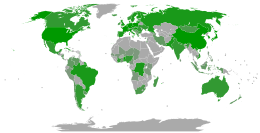
Back Есперанто Abkhazian Ӏэспэранто ADY Esperanto Afrikaans Esperanto ALS Эсперанто ALT ኤስፔራንቶ Amharic Esperanto AN Esperanto ANG एस्पेरान्तो ANP إسبرانتو Arabic
| Esperanto | |
|---|---|
| International language | |
| Esperanto | |
 | |
| Pronunciation | [espeˈranto] ( |
| Created by | L. L. Zamenhof |
| Date | 1887 |
| Setting and usage | International auxiliary language |
| Users | Native: estimated 1000 to several thousand (2016)[1][2] L2 users: estimates range from 63 000[3] to two million[4] |
| Purpose | constructed language
|
Early form | |
| Latin script (Esperanto alphabet) Esperanto Braille | |
| Signuno | |
| Sources | Vocabulary from Romance and Germanic languages, grammar from Slavic languages |
| Official status | |
| Regulated by | Akademio de Esperanto |
| Language codes | |
| ISO 639-1 | eo |
| ISO 639-2 | epo |
| ISO 639-3 | epo |
 Esperantujo: 120 countries worldwide | |
Esperanto is a constructed auxiliary language. Its creator was L. L. Zamenhof, a Polish eye doctor. He created the language to make international communication easier. His goal was to design Esperanto in such a way that people can learn it much more easily than any other national language.
At first, Zamenhof called the language La Internacia Lingvo, which means "The International Language" in Esperanto. Soon, people began calling it by the simpler name Esperanto, which means "one who hopes". That name comes from Doktoro Esperanto ("Doctor who hopes"), which is what Zamenhof called himself in his first book about Esperanto.
There are people who speak Esperanto in many countries and in all the major continents. No one knows exactly how many people now speak Esperanto in the world. Most sources say that there are between several hundred thousand and two million Esperanto speakers.[6] A few people grew up speaking Esperanto as their first language. There may perhaps be around 2,000 of these people.[7] Therefore, Esperanto is the most-used constructed language in the world.
A person who speaks or supports Esperanto is often called an "Esperantist".
- ↑ Harald Haarmann, Eta leksikono pri lingvoj, 2011, archive date March 4, 2016: Esperanto … estas lernata ankaŭ de pluraj miloj da homoj en la mondo kiel gepatra lingvo. ("Esperanto has also been learned by several thousand people in the world as a mother tongue.")
- ↑ Jouko Lindstedt, Jouko, Oftaj demandoj pri denaskaj Esperant‑lingvanoj ("Frequently asked questions about native Esperanto speakers"), archive date March 3, 2016.
- ↑ "Nova takso: 60.000 parolas Esperanton" [New estimate: 60.000 speak Esperanto] (in Esperanto). Libera Folio. February 13, 2017. Retrieved February 13, 2017.
- ↑ "Esperanto" (20th ed.). Ethnologue. Retrieved October 6, 2017.
- ↑ What is UEA?, Universal Esperanto Association, 2018. Retrieved July 21, 2018.
- ↑ Simons, Gary F.; Charles D. Fennig (2017). "Ethnologue: Languages of the World". Dallas, Texas: SIL International. Archived from the original on March 17, 2017. Retrieved March 21, 2017.
- ↑ Keating, Fiona (December 14, 2015). "Top 10 facts you didn't know about Esperanto". International Business Times. IBTimes Co.
Up to 2 million people worldwide are estimated to speak Esperanto, including around 2,000 native speakers who learned Esperanto from birth.
© MMXXIII Rich X Search. We shall prevail. All rights reserved. Rich X Search